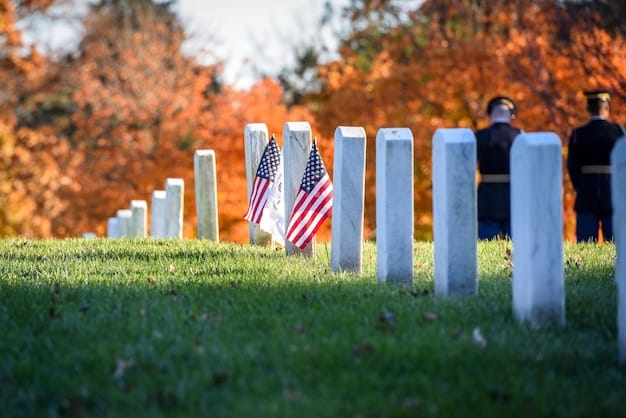American Holidays 2025: A Cultural Calendar & Significance

Anúncios
Understanding the Significance of American Holidays: A 2025 Cultural Calendar explores the historical context, cultural importance, and traditions associated with major holidays in the United States, providing an insightful look into how these celebrations shape American identity.
Dive into Understanding the Significance of American Holidays: A 2025 Cultural Calendar. Delve into the heart of the USA’s traditions and their lasting impact.
Anúncios
Exploring New Year’s Day Celebrations
New Year’s Day marks the beginning of a fresh calendar year, but its significance goes beyond just turning a page. It’s a time steeped in traditions, hopes, and reflections on the past year.
In the United States, New Year’s Day is often celebrated with festive gatherings, parades, and the iconic ball drop in Times Square. However, understanding its deeper roots can enrich our appreciation for this annual event.
Anúncios
Historical Context of New Year’s Day
The celebration of the new year dates back thousands of years, with different cultures observing it at various times of the year. The modern Gregorian calendar, adopted by many countries including the United States, sets January 1 as the start of the year.
Popular New Year’s Traditions
Many Americans observe specific traditions on New Year’s Day, believing they will bring good fortune in the coming year. These traditions often vary by region and cultural background.
- Eating black-eyed peas in the South, symbolizing prosperity.
- Making resolutions to improve oneself in the new year.
- Watching or participating in parades, such as the Rose Parade in Pasadena, California.
- Attending or hosting parties with friends and family.

In conclusion, New Year’s Day is not just a date but a cultural phenomenon laden with historical and societal significance. It’s a time for reflection, hope, and communal celebration, setting the tone for the year ahead.
Honoring Martin Luther King Jr. Day
Martin Luther King Jr. Day, observed on the third Monday of January, is more than just a day off from work or school. It’s a day to reflect on the life and legacy of one of America’s most influential civil rights leaders.
This holiday serves as a reminder of the ongoing struggle for equality and justice, as well as an opportunity to honor Dr. King’s dream of a society where individuals are judged not by the color of their skin, but by the content of their character.
The Legacy of Martin Luther King Jr.
Martin Luther King Jr. was a pivotal figure in the Civil Rights Movement, advocating for nonviolent resistance to racial segregation and discrimination. His leadership and powerful speeches inspired millions to demand equal rights.
Celebrating King’s Dream Today
There are numerous ways to commemorate Martin Luther King Jr. Day, from participating in community service projects to attending educational events and reflecting on the ongoing pursuit of social justice.
- Engaging in volunteer work to help those in need.
- Attending lectures, workshops, or seminars on civil rights and social justice.
- Reading Dr. King’s speeches and writings to understand his vision.
- Supporting organizations that promote equality and fight discrimination.
Martin Luther King Jr. Day is a crucial reminder of America’s past struggles and the ongoing need to strive for equality and justice for all. It’s a day to remember Dr. King’s legacy and recommit ourselves to his dream.
Celebrating Presidents’ Day: A Historical Perspective
Presidents’ Day, officially Washington’s Birthday, is observed on the third Monday of February. It is a day set aside to honor the leaders who have shaped the nation.
Originally established to celebrate George Washington’s birthday, it has evolved to honor all past presidents of the United States, providing an opportunity to reflect on their contributions and legacies.
The Evolution of Presidents’ Day
The holiday was initially created in 1885 to celebrate George Washington’s birthday. Over time, it became known as Presidents’ Day, encompassing all U.S. presidents.
Recognizing Presidential Achievements
Presidents’ Day provides a chance to explore the achievements and challenges faced by past presidents, from the founding fathers to more recent leaders.
Studying their leadership styles can offer insights into effective governance and the complexities of decision-making. Understanding their roles in critical moments helps us learn from history.
Presidents’ Day is a moment to reflect on the leadership and vision that have guided the United States through its history, appreciating the individuals who have taken on the weighty responsibilities of the presidency.
Understanding the Significance of Memorial Day
Memorial Day, observed on the last Monday of May, is a solemn occasion to honor and remember the men and women who died while serving in the United States Armed Forces.
It is a day of national mourning and remembrance, distinct from Veterans Day which celebrates all who have served. Memorial Day provides an opportunity to reflect on the sacrifices made to protect the nation’s freedoms.
Honoring Fallen Heroes
Memorial Day is dedicated to remembering those who lost their lives in military service. It’s a time to recognize the ultimate sacrifice they made for the country.
Traditions and Observances
Memorial Day is marked by various traditions, including visiting cemeteries and memorials, flying the American flag at half-staff, and participating in parades and ceremonies.

- Visiting cemeteries and placing flags or flowers on the graves of fallen soldiers.
- Attending memorial services and parades in local communities.
- Observing a national moment of silence at 3:00 p.m. local time.
Memorial Day is a time for collective remembrance and gratitude, honoring the brave individuals who gave their lives in service to the United States.
Celebrating Independence Day: The Fourth of July
Independence Day, celebrated on July 4th, commemorates the adoption of the Declaration of Independence in 1776, declaring the United States as a free and independent nation.
It is a day of patriotic celebration, filled with fireworks, parades, barbecues, and gatherings with family and friends. Beyond the festivities, it’s a time to reflect on the principles of freedom and democracy upon which the nation was founded.
The Declaration of Independence
The Declaration of Independence is a foundational document in American history, articulating the reasons for the American colonies’ separation from British rule. It asserts the rights to life, liberty, and the pursuit of happiness.
Celebrating Freedom and Democracy
Independence Day is a time to celebrate the ideals of freedom, democracy, and self-governance. It’s an opportunity to reflect on the rights and responsibilities of citizens in a democratic society.
Reflecting on the nation’s history fosters a deeper understanding of the ongoing efforts to uphold these principles for all citizens. Understanding the historical struggles contributes to civic responsibility.
Independence Day is a vibrant celebration of American identity and the principles of freedom and democracy, cherished and upheld throughout the nation’s history.
Thanksgiving: A Time for Gratitude and Reflection
Thanksgiving Day, celebrated on the fourth Thursday of November, is a time for Americans to express gratitude for the blessings in their lives and to gather with family and friends.
Rooted in the history of the early European settlers and their interactions with Native Americans, Thanksgiving has evolved into a secular holiday focused on food, family, and giving thanks.
The Historical Context of Thanksgiving
The traditional story of Thanksgiving involves the Pilgrims and the Wampanoag Native Americans sharing a harvest feast in 1621. This event has been romanticized over time and represents a complex history of cultural exchange and conflict.
Modern Thanksgiving Traditions
Modern Thanksgiving celebrations typically involve a large meal featuring turkey, stuffing, mashed potatoes, and cranberry sauce. Families often travel long distances to be together, and many engage in charitable activities.
- Preparing and sharing a large Thanksgiving meal with family and friends.
- Expressing gratitude for the blessings in one’s life.
- Participating in charitable activities, such as donating food or volunteering at a soup kitchen.
Thanksgiving is a cherished American holiday that combines historical reflection with contemporary expressions of gratitude and community spirit.
| Key Aspect | Brief Description |
|---|---|
| 🎉 New Year’s Day | Celebrates the start of a new year with traditions and resolutions. |
| ✊ MLK Jr. Day | Honors the legacy and civil rights work of Martin Luther King Jr. |
| 🇺🇸 Independence Day | Commemorates the adoption of the Declaration of Independence on July 4th. |
| 🦃 Thanksgiving | A day of gratitude and reflection, typically celebrated with a large feast. |
FAQ
▼
Understanding American holidays provides insight into the nation’s history, values, and cultural identity. These holidays reflect important events and figures that have shaped the country.
▼
American holidays influence societal norms, traditions, and economic activities. They serve as focal points for community gatherings, family traditions, and national pride, impacting social cohesion.
▼
Memorial Day is crucial for honoring and remembering the men and women who died while serving in the U.S. Armed Forces. It’s a day of national mourning and reflection on their sacrifices.
▼
Americans celebrate Independence Day to commemorate the adoption of the Declaration of Independence in 1776. It symbolizes the country’s freedom, democracy, and pursuit of individual liberties.
▼
Thanksgiving holds cultural significance as a time for gratitude, family gatherings, and reflection on blessings. It’s rooted in history, evolving into a holiday of sharing, community, and thankfulness.
Conclusion
Understanding the significance of American holidays involves delving into the history, traditions, and values that shape the national identity. From New Year’s Day to Thanksgiving, each holiday provides a unique lens through which to view American culture and its enduring impact on society.





